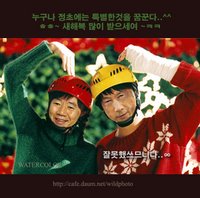 Appropriate Admonition
Appropriate Admonition2006-03-02 20:03 KoreaTimes
President Roh Moo-hyun's criticism Wednesday of Japan and his Japanese counterpart, Prime Minister Junichiro Koizumi, was unusually harsh but proper. Tokyo's reaction, however, showed Roh's words fell largely on deaf ears _ once again. It is sad the two neighbors have to talk at cross-purposes 60 years after the end of colonial domination. Sadder still, their relationship appears to be getting even worse rather than better, given the mentality of postwar-generation Japanese leadership. In sum, the Korean leader was saying, ``Stop eating your words and prove them with action.'' Successive Japanese leaders have apologized for colonial rule and wartime atrocities, but without actually meaning it. Now the leaders and their people, particularly the younger generation, appear sick and tired of repeating even the insincere apologies, revealing they are actually prisoners of conscience at heart. Nothing shows this better than Koizumi's annualized visits to the Yasukuni Shrine based on ``personal conviction.'' Japan says Asian neighbors should recognize its peace-loving efforts after World War II and seek a future-oriented relationship. In short, Tokyo is like a reformed and repentant wrongdoer wanting a new start. Actions often speak louder than words, however. Koizumi's homage to the war shrine has invited criticism from the world over, including the United States and France. But the rebukes from Japan's mainstream conservatives are mainly aimed at repealing its peace constitution ``more quietly.'' Roh's advice was to the point, but Seoul also has a problem of diplomatic consistency. Every time a Japanese politician makes a reckless remark, the government appears to agonize over the tone of its retort. Those responses also vary widely from unnecessarily aggressive to spinelessly passive. This can give the wrong impression to Tokyo that Seoul is using the war of nerves as a ``diplomatic card.'' And it compares poorly with Beijing's stance, which has severed almost all top-level contacts with Tokyo. The Koizumi administration seems to think its close alliance with Washington would offset squeaky relationships with Asian partners. But such a diplomatic miscalculation will cost Japan dearly, with China emerging as not just a regional authority but also a global power and a unified Korea posing tougher challenges. Tokyo's arrogance will make it the biggest stumbling block to this region's cooperation and eventual integration. Before it is too late, the older generation needs to tell the truth to younger successors. All Tokyo needs to do is stop making actions and remarks that reverse its previous admission and remorse. But Chief Cabinet Secretary Shinzo Abe, the mostly likely successor to Koizumi, says future prime ministers should continue visits to the Yasukuni Shrine. Seoul might as well prepare for a prolonged diplomatic battle with fixed principles and detailed actions.
